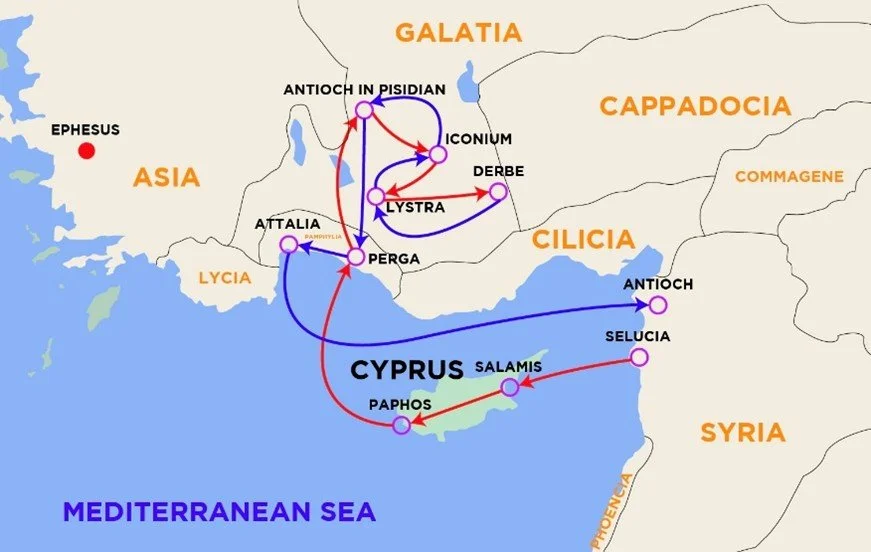Reading Luke/Acts Together #67 – Preach Like Paul
Acts chapter 13 narrates how the small, young church in Antioch sent out their first two missionaries, Saul and Barnabas. Why these two? Saul/Paul had the ultimate, persuasive personal story; plus they must have detected in him the genius and flair for words and theological insight he would put on display in his brilliant letters written over the next two decades. And Barnabas – well-known as an encourager. As I often say, nobody gets too much encouragement. How lovely that the first guy sent out wasn’t a scolder or a master of logic, but a lover of people, an encourager of souls.
You can plot their route on a map, and my pilgrimage groups have visited most of these places. Seleucia to the island of Cyprus, back to what is today mainland Turkey at Perga, into the heartland of Pisidia, then Attalia back on the coast, and finally home to Antioch. Two years on the road, 1500 miles, much of it on foot, the rest aboard creaky boats, with no hotels or restaurants. Strangers in strange places with a strange message. Tough stuff these two were made of!
Already they meet not just people too busy to listen or too set in their ways to believe anything new and revolutionary, but actual hostility, which they perceive to be demonic. You don’t have to believe in a red guy with a pitchfork breathing fire to understand there is very real and very personal evil out there in the world, and perched on your shoulder whispering in your ear. Learning to be wary of spiritual voices that are not of God, and that even lead you far from God is an essential skill in the life of faith.
Paul and Barnabas were not speaking to irreligious people. They were very religious, and probably had a greater sensitivity to the numinous, to the supernatural, to the mysterious, than we do. It was the ancient world, science was nothing but a trickle, and life was hardscrabble and unpredictably brief. Average life span hovered just above 30. Plenty to fear, between the weather, disease, misunderstood mental illness, and the dreaded Roman legions and their tax collectors.
Perhaps it was precisely their fears, and the uncertainty around mortality that provided the opening for the Christian message – which by any measure was far superior to the pagan gods, who were moody, capricious, and never thought to have love for people. This Christian God? Very involved, consistent, gracious, and with the promise of eternal life? You’d take a chance on such a God – and it was taking a chance, as ridicule and outright persecution were on the rise at the very outset of the church’s life and growth. It took courage – but then people, deep inside, are drawn to strive for what requires courage and even sacrifice (although they aren’t always aware of this drive!).
Paul’s preaching amazes me. No jokes. No spellbinding illustrations. He simply retells the story of the Bible. God did this, then that, then the next thing. Jesus’ life, death and resurrection provide the climax to the story. We always want preachers to dress it up, or we want to read a devotional or some other book to make the primary story seem cooler or more compelling. Paul simply trusted the story.
I’m reminded of Dietrich Bonhoeffer’s early ministry. He was an intellectual giant already, with not one but two earned doctorates in theology – and he found himself in a poor neighborhood of Berlin with adolescents with juvenile records, neglectful parents and behavior and academic struggles. He tried philosophical reasoning, and they just got louder and more obnoxious. Then he decided he’d simply tell them Bible stories, straight up. They listened. They changed. They loved him. Their lives were much enhanced. What’s the old hymn line? “Can you preach like Paul?”
